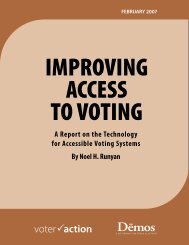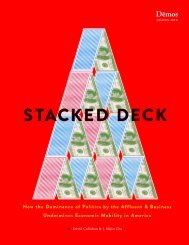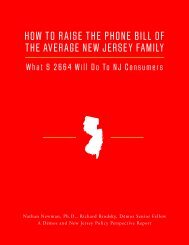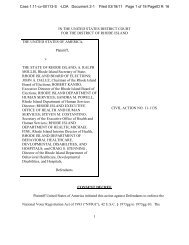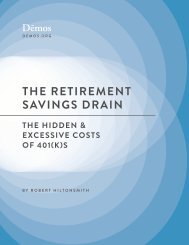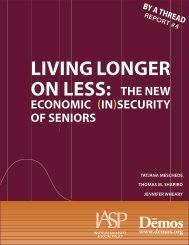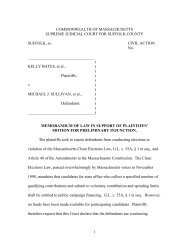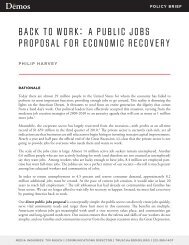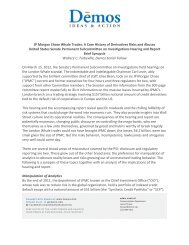Bullies at the Ballot Box - Demos
Bullies at the Ballot Box - Demos
Bullies at the Ballot Box - Demos
Create successful ePaper yourself
Turn your PDF publications into a flip-book with our unique Google optimized e-Paper software.
el<strong>at</strong>es to <strong>the</strong> conducting of an election from a<br />
polling place, and it is illegal to intimid<strong>at</strong>e an election<br />
officer or o<strong>the</strong>rwise interfere with <strong>the</strong> conduct of an<br />
election. 379 Ohio law is also explicit th<strong>at</strong> no person may<br />
“loiter” or “congreg<strong>at</strong>e” “within <strong>the</strong> area between <strong>the</strong><br />
polling place and <strong>the</strong> small flags” th<strong>at</strong> officials place<br />
100 feet from <strong>the</strong> polling place. 380 Finally, in Ohio is<br />
illegal to “hinder or delay an elector in reaching or<br />
leaving” <strong>the</strong> polling place.” 381<br />
Pennsylvania<br />
Pennsylvania law prohibits any manner of intimid<strong>at</strong>ion<br />
or coercion in order to induce or compel persons<br />
to vote or refrain from voting <strong>at</strong> any election. 382<br />
Pennsylvania’s anti-intimid<strong>at</strong>ion st<strong>at</strong>ute specifically<br />
prohibits restraining, thre<strong>at</strong>ening, or using any force<br />
th<strong>at</strong> interferes with any person’s efforts to cast a<br />
ballot. 383 The law also makes it illegal to use any<br />
fraudulent device th<strong>at</strong> interferes with voters or induces<br />
a voter to give his or her vote for or against any<br />
particular person <strong>at</strong> any election. 384 Any individual or<br />
corpor<strong>at</strong>ion, whe<strong>the</strong>r for profit or not for profit, who<br />
viol<strong>at</strong>es <strong>the</strong>se provisions faces a fine of up to $5000<br />
and up to two years of imprisonment. 385<br />
texas<br />
Texas law prohibits a person from indic<strong>at</strong>ing to a voter<br />
in a polling place “by word, sign, or gesture how <strong>the</strong><br />
person desires <strong>the</strong> voter to vote or not vote.” 386 It is<br />
a misdemeanor in Texas to loiter or electioneer for<br />
or against any candid<strong>at</strong>e, measure, or political party<br />
during <strong>the</strong> voting period within 100 of an outside<br />
door. 387 It is also a misdemeanor for a person not<br />
engaged in activities specifically permitted by <strong>the</strong><br />
Election Code to be in <strong>the</strong> polling place “from <strong>the</strong> time<br />
<strong>the</strong> presiding judge arrives <strong>the</strong>re on Election Day to<br />
make <strong>the</strong> preliminary arrangements until <strong>the</strong> precinct<br />
returns have been certified and <strong>the</strong> election records<br />
have been assembled for distribution following <strong>the</strong><br />
election.” 388<br />
virginia<br />
Virginia makes it a crime for any person (i) to loiter<br />
or congreg<strong>at</strong>e within 40 feet of any entrance of any<br />
polling place; (ii) within such distance to give, tender,<br />
30 • <strong>Bullies</strong> <strong>at</strong> <strong>the</strong> <strong>Ballot</strong> <strong>Box</strong> | September 2012<br />
or exhibit any ballot, ticket, or o<strong>the</strong>r campaign<br />
m<strong>at</strong>erial to any person or to solicit or in any manner<br />
<strong>at</strong>tempt to influence any person in casting his vote; or<br />
(iii) to hinder or delay a qualified voter in entering or<br />
leaving a polling place. 389 Virginia law fur<strong>the</strong>r prohibits<br />
<strong>at</strong>tempts to influence a person’s vote by “thre<strong>at</strong>s,<br />
bribery, or o<strong>the</strong>r means in viol<strong>at</strong>ion of <strong>the</strong> election<br />
laws.” 390 It is a misdemeanor for any person to hinder<br />
or delay a qualified voter or election officer, to give<br />
a ballot, ticket, or o<strong>the</strong>r campaign m<strong>at</strong>erial to any<br />
person, to solicit or influence any person in casting his<br />
vote, or o<strong>the</strong>rwise impede <strong>the</strong> orderly conduct of <strong>the</strong><br />
election. 391<br />
reCommend<strong>at</strong>IonS rel<strong>at</strong>ed to<br />
St<strong>at</strong>e Voter IntImId<strong>at</strong>Ion laWS<br />
Many st<strong>at</strong>e laws discussed above are clearly applicable<br />
to a wide range of intimid<strong>at</strong>ion tactics, including “True<br />
<strong>the</strong> Vote”-like tactics of “hovering” around voters<br />
and disrupting voting lines snaking around outside<br />
of polling places. 392 There are, however, a number<br />
of things th<strong>at</strong> can be done to provide even more<br />
protection from harassment masquerading as citizen<br />
law enforcement. We recommend th<strong>at</strong> legisl<strong>at</strong>ors take<br />
steps to provide more clarity with regard to rules<br />
rel<strong>at</strong>ing to voter intimid<strong>at</strong>ion outside of <strong>the</strong> polling<br />
place. Many of <strong>the</strong> surveyed laws are broadly drafted,<br />
rendering <strong>the</strong>ir applic<strong>at</strong>ion to certain behaviors<br />
ambiguous.<br />
We might consider analogizing <strong>the</strong>se practices<br />
to electioneering. Electioneering generally involves<br />
handing out campaign m<strong>at</strong>erials, displaying signs,<br />
and o<strong>the</strong>rwise advoc<strong>at</strong>ing for <strong>the</strong> support or defe<strong>at</strong><br />
of a candid<strong>at</strong>e by using <strong>the</strong> candid<strong>at</strong>e’s name. All ten<br />
st<strong>at</strong>es surveyed for this report have laws prohibiting<br />
electioneering within specific distances of polling places<br />
on Election Day because <strong>the</strong> st<strong>at</strong>es believe th<strong>at</strong> some<br />
solicit<strong>at</strong>ion-free zones are necessary to protect voters<br />
from confusion and undue influence and to preserve<br />
<strong>the</strong> integrity and dignity of <strong>the</strong> election process. 393<br />
These rules are consistently upheld by <strong>the</strong> courts,<br />
including when <strong>the</strong> Supreme Court upheld a Tennessee<br />
electioneering law th<strong>at</strong> prohibited electioneering within<br />
one hundred feet of a polling place. 394<br />
Ano<strong>the</strong>r analogy to consider are <strong>the</strong> laws th<strong>at</strong>




